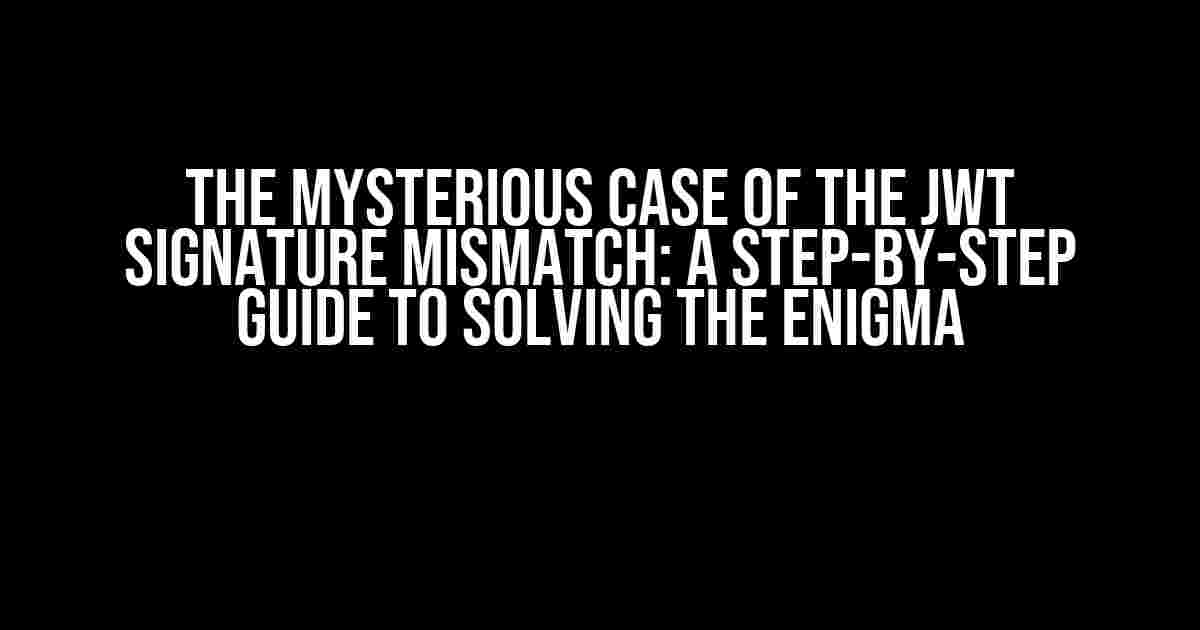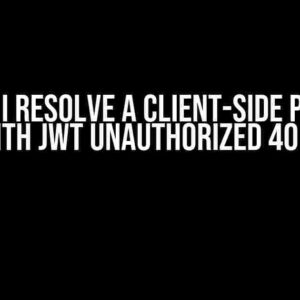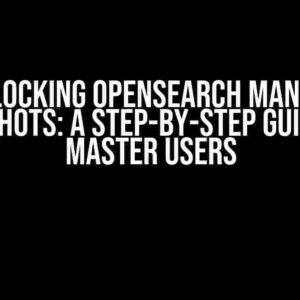Are you mystified by the error message “JWT signature does not match locally computed signature, although the key signed-with when generating and validating token is the same”? You’re not alone! This enigmatic issue has baffled many a developer, leaving them scratching their heads in frustration. Fear not, dear reader, for we’re about to embark on a journey to unravel the mystery behind this pesky error and provide a comprehensive guide to resolving it.
What is a JWT Signature, Anyway?
Before we dive into the nitty-gritty of the issue, let’s take a brief detour to understand what a JSON Web Token (JWT) signature is. A JWT is a standardized method for securely transmitting information between parties. It consists of three parts: a header, a payload, and a signature. The signature is generated using a secret key, which ensures the token’s authenticity and integrity.
How is the JWT Signature Generated?
The JWT signature is generated using the following formula:
HS256( base64UrlEncode(header) + "." + base64UrlEncode(payload), secretKey )
In simpler terms, the header and payload are encoded using base64url, concatenated with a dot (.), and then signed using the HS256 algorithm with the secret key.
The Mysterious Error Message: “JWT Signature Does Not Match Locally Computed Signature”
So, what happens when the JWT signature doesn’t match the locally computed signature, despite using the same secret key? It’s as if the universe has decided to play a cruel joke on you. Fear not, for we’re about to explore the possible causes behind this enigma.
Possible Causes:
Before we begin, make sure you’ve checked the obvious:
- The secret key is identical when generating and validating the token.
- The token is not tampered with during transmission.
Assuming you’ve verified the above, let’s move on to more subtle culprits:
1. Encoding Issues
Incorrect encoding can lead to differences in the signature. Ensure that:
- Base64url encoding is used for both the header and payload.
- The encoding is consistent across all platforms and languages.
2. Timestamp Issues
Token expiration (exp) and issued at (iat) claims can cause issues if not handled correctly. Verify that:
- The timestamp is in seconds (not milliseconds) when generating the token.
- The timestamp is correctly parsed when validating the token.
3. Algorithm Mismatch
Using different algorithms for signing and validating can result in signature mismatches. Ensure that:
- The same algorithm (e.g., HS256) is used for both signing and validating.
- The algorithm is correctly specified when generating and validating the token.
4. Secret Key Format
The secret key format can differ between platforms or languages, leading to signature mismatches. Verify that:
- The secret key is in the correct format (e.g., bytes, string, or hexadecimal).
- The secret key is correctly decoded or encoded when generating and validating the token.
5. Library or Framework Issues
Sometimes, the issue lies with the library or framework used for JWT generation and validation. Check if:
- The library or framework is up-to-date and compatible with your platform.
- The library or framework uses the correct algorithm and encoding.
Step-by-Step Troubleshooting Guide
To help you resolve the issue, follow this step-by-step guide:
-
Verify the secret key: Ensure the secret key is identical when generating and validating the token. Compare the keys byte-by-byte to eliminate any encoding issues.
-
Check encoding: Verify that base64url encoding is used for both the header and payload. Use a debugging tool or library to inspect the encoded values.
-
Inspect the token: Use a JWT debugger or library to inspect the token’s header, payload, and signature. Compare the values with the expected output.
-
Verify timestamps: Check the token’s expiration and issued at claims. Ensure the timestamps are in seconds and correctly parsed.
-
Compare algorithms: Verify that the same algorithm is used for both signing and validating. Check the algorithm specified in the token’s header.
-
Secret key format: Verify the secret key format is correct and consistent across platforms or languages.
-
Library or framework issues: Check if the library or framework is up-to-date and compatible with your platform. Verify that the library or framework uses the correct algorithm and encoding.
Conquering the Mysterious Error Message
By following this comprehensive guide, you should now be equipped to tackle the enigmatic “JWT signature does not match locally computed signature” error. Remember to identify and address the root cause of the issue, whether it’s encoding, timestamp, algorithm, or secret key-related. With patience and persistence, you’ll conquer this mystery and ensure the integrity of your JWT-based authentication system.
| Common Pitfalls | Solutions |
|---|---|
| Incorrect encoding | Use base64url encoding for both header and payload. |
| Timestamp issues | Verify timestamp format and parsing. |
| Algorithm mismatch | Use the same algorithm for both signing and validating. |
| Secret key format issues | Verify secret key format and decoding/encoding. |
| Library or framework issues | Check library or framework compatibility and correct usage. |
By mastering the art of JWT signature verification, you’ll ensure the security and reliability of your application. Remember, a thorough understanding of the JWT signing process and attention to detail are key to resolving the “JWT signature does not match locally computed signature” error.
Conclusion
In conclusion, the “JWT signature does not match locally computed signature” error can be a daunting challenge, but by following this comprehensive guide, you’ll be well-equipped to tackle the issue. Remember to verify the secret key, check encoding, inspect the token, and address any algorithm, timestamp, or library-related issues. With persistence and patience, you’ll conquer this enigma and ensure the integrity of your JWT-based authentication system.
Frequently Asked Question
Got stuck with JWT signature issues? Worry not, we’ve got the answers!
Why does the JWT signature not match locally computed signature even when using the same key?
This issue often arises due to differences in the way the key is encoded or formatted between the generating and validating parties. Ensure that the key is encoded in the same format (e.g., PEM, DER, or JWK) and that any necessary padding or encoding (e.g., Base64URL) is applied consistently.
Can a leading or trailing slash in the key affect the signature validation?
Yes, it can! A leading or trailing slash in the key can cause the signature to mismatch. Make sure to remove any extraneous characters from the key before using it for signing or validation.
Does the order of the key components (e.g., kid, alg, typ) affect the signature?
Yes, the order of the key components can impact the signature. Ensure that the key components are in the correct order and that any unnecessary components are removed. This is especially important when using a JWK (JSON Web Key) as the key.
Can clock skew or timezone differences cause signature validation issues?
Yes, clock skew or timezone differences can cause issues with signature validation, especially when using tokens with short lifetimes. Ensure that the clocks on both the generating and validating systems are synchronized and that any timezone differences are accounted for.
Are there any libraries or tools that can help with JWT signature validation?
Yes, there are many libraries and tools available that can assist with JWT signature validation, such as jsonwebtoken (Node.js), pyjwt (Python), and JWT.io (online debugger). These libraries can help simplify the validation process and identify common issues.



